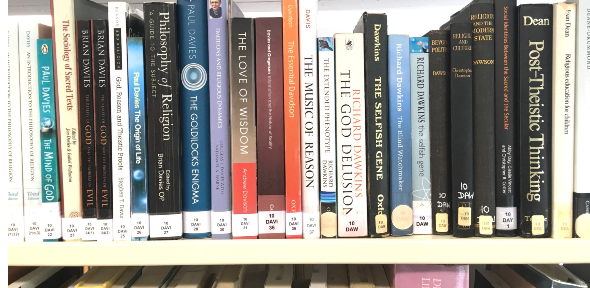
Is Cambridge the best place to study theology?
Cambridge University's Theology, Religion, and Philosophy of Religion (TRPR) undergraduate course consistently ranks top amongst the world’s top academic programs for the study of theology. In 2024 the TRPR course came top in several league tables:
- The Guardian Rankings: The Cambridge TRPR course clinched first position in The Guardian's higher education rankings, a position we have held for several years and which affirms our status as the premier program in theology, religion, and philosophy in the UK.
- The Times Rankings: The TRPR tripos secured the highest place in The Times rankings, with the excellent career prospects of our graduates topping all other universities
- The Complete University Guide Rankings: Our course came out top, with our students again being recognised for their outstanding graduate prospects
- QS World University Rankings: In the QS World University Rankings, which takes into account academic reputation, employer reputation and faculty research, Cambridge ranked 4th in the world, affirming our global reputation for excellence in religious and philosophical studies.
Is studying Theology, Religion and Philosophy of Religion for me?
Reading widely and exploring different areas of theology, religion and philosophy of religion is a good place to start. It can also help your application stand out in terms of supercurriculars. We've put together a list of books (fiction and non-fiction), podcasts, free courses and videos to help you find out more about your own interests and work out whether studying Theology, Religion and Philosophy of Religion is for you.
This is not a 'required reading list', nor is there any expectation prospective candidates explore these suggestions. If you are intending to apply to Cambridge, there is guidance regarding your personal statement towards the end of the page.
Cambridge Resources
Cambridge in your classroom |
A series of mini lectures on topics that support that A level syllabus for Religious Studies. As well as being a good opportunity to meet some of our lecturers, the videos are accompanied by a series of resources that may be of use as you develop your super-curricular interests. |
| 50 Religious Treasures: an inspiring, interactive resource |
50 Religious Treasures introduces you to a range of artefacts and images associated with religion, art and material culture. Discover the unusual treasures of the museums, colleges and the city of Cambridge. Each treasure was chosen by a member of the Faculty of Divinity, giving you an insight into the wide and varied interests of our teaching staff. Use the treasures as a starting point to further your own independent research. |
| HE+ | HE+, run by the University of Cambridge, has a section for sixth form students to further your interest in religious studies. The site gives you the opportunity to read about a topic that isn't linked to your A-level curriculum. You can discover resources such as extra reading material, links to external websites and exercises to try out. |
| Divinity Dispatches: Cambridge Divinity Online during a time of confinement | Created to encourage the Faculty of Divinity to keep in touch during the COVID shutdown, you'll find lectures, photos, recipes and more on this site |
| The Woolf Institute | The Woolf Institute is a University Institute aimed at improving relations between religion and society through education. They have an extensive series of podcasts including the A-Z of Believing, Inside Fundamentalism, and Encounter. |
| The Faraday Institute for Science and Religion | If you are interested in science and religion, then this is a good place to start. The Faraday Institute has a vast collection of over 700 lectures, courses, discussions and research seminars to browse through. |
| The Cambridge Inter-faith Project | The Cambridge Inter-Faith Programme was founded in 2002 to explore questions about the relationship between Jews, Christians and Muslims. Their website has a number of articles and recorded lectures, and a section on how you can study inter-faith within the Cambridge undergraduate degree. |
| The Faculty of Divinity YouTube channel | You can find out more about career options here, as well as what it is like to study at Cambridge. We have some academic lectures available, including those recorded as part of the Faculty of Divinity Lockdown Film Club. |
| New Trinitarian Ontologies | The New Trinitarian Ontologies Conference was held at the University of Cambridge in September 2019, featuring theologians including Rowan Williams, David Bentley Hart, John Milbank, Thomas Joseph White, Catherine Pickstock, John Betz, Andrew Louth, Graham Ward, and many more. The New Trinitarian Ontologies Symposium followed on from this in March 2020, and includes excellent student discussions on Ressourcement, Tragic Poetics, Absoluteness & Nothingness, and the Politics of Participation. |
Resources from Further Afield
Books and Articles (in no particular order) |
We don't expect prospective candidates to spend a fortune on books. We have tried to list material that is readily available and fairly inexpensive. The links below are for Amazon, but we recommend searching other booksellers too, as bargains can often be found.
|
Websites, Podcasts and Videos |
|
Free Courses and Competitions |
|
Finding out more about the Faculty of Divinity
|
You can access taster lectures, film club commentary and information talks on our YouTube channel. In addition, in 2015 we filmed some of the talks from an Open Day. Please note that there may be some differences in the course since these films were made (notably that our course is now BA Theology, Religion, and Philosophy of Religion and we have introduced an at-interview admissions exercise), but you may still find it helpful to view some of the talks. |
